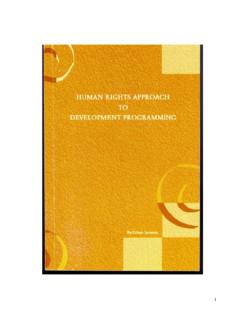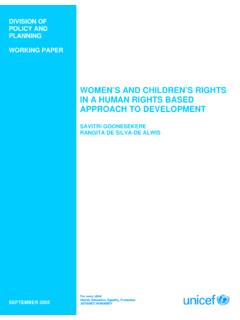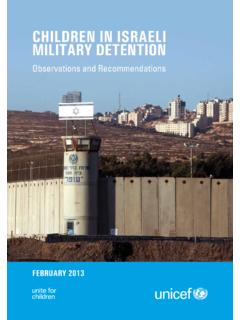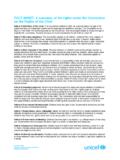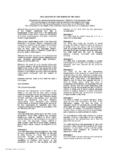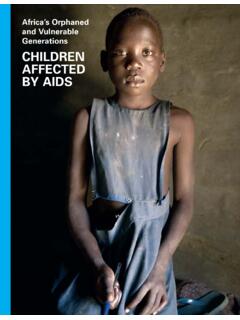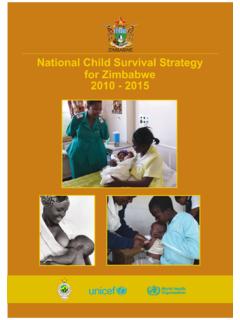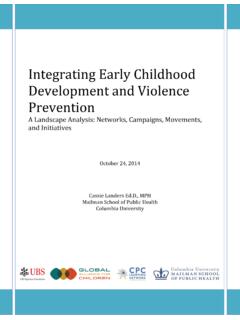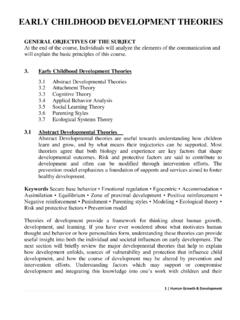Transcription of Care for Child Development - UNICEF
1 care for Child Development Regional Training of Trainers in early childhood Development in Response to the Sahel crisis 11 - 15 June 2012 Dakar, Senegal UNICEF West and Central Africa Regional Office Participating Organizations UNICEF , WHO, Ministry of Education Senegal, Ecole nationale des travailleurs sociaux, Ministry of Health Botswana, NGO Enda-Tier Monde, NGO World Education, NGO Tostan and Hospital St. Martin de Rebeuss 2 Table of Contents The Sahel Crisis and Its Impact on Children .. 3 Overview of the care for Child Development Training .. 6 Reflections From a Course Facilitator .. 9 Building a Regional Prototype for the Development of a National ECD System in WCARO.
2 11 Conclusions and Recommendations .. 12 Participants Evaluation of the Training .. 14 The Way Forward for Participating Country Teams .. 16 References .. 17 Annex 1: Participant List .. 18 Annex 2: Feedback Form .. 19 Annex 3: Training Schedule .. 20 3 The Sahel Crisis and Its Impact on Children The lean season from May to August is an extremely risky time for the residents of the Sahel region. No crops are in the fields, thus households rely on what has been produced the previous year. Unfortunately, scarce rains, increasing food prices, poor harvests and economic and political instability caused a critical food shortage in 2012. More than 18 million people, including one million children under age five, are expected to suffer from severe malnutrition in 2012 ( UNICEF , 2012a).
3 This is the third time in less than 10 years that the Sahel region has been hit by severe drought. Droughts in 2005 and 2010 forced families to sell their livestock, borrow money and stop sending their children to school as they coped with the food crisis. In 2012, these families and especially their children are more vulnerable than ever. Even when no drought threatens the region, about 500,000 children die each year from causes related to food shortage. During droughts, that figure can be dramatically higher. In West and Central Africa, eight countries are most affected: Senegal, Mauritania, Mali, Burkina Faso, Niger, Nigeria, Chad and Cameroon ( ).
4 Main areas of food insecurity and malnutrition in the Sahel region Fig. 1: Source: OCHA response plan addressing the food and nutrition crisis in the Sahel, 2012. Accessible online at In addition, continuing conflict in Mali has forced 170,000 people to leave their homes and flee to neighbouring countries ( UNICEF , 2012b). The displacement of children in dispersed locations makes it challenging to provide support and slows down emergency interventions such as food supplementation, school materials distribution and psychosocial support. The Sahel crisis places many stresses on families. Parents relocate looking for better economic opportunities, and children are withdrawn from school.
5 early childhood programmes are not delivered 4 regularly. Nutrition interventions cannot meet the needs of all who require assistance. These conditions leave parents vulnerable and unable to provide adequate stimulation, attention and nurturance to their children. This starts a vicious cycle: Hungry children become apathetic and do not cry or crawl for food; this leads to neglect by parents; that neglect leads to children becoming sick. Children are the first victims of the food crisis. But even those children who survive could face permanent health damage because the first years of life are fundamental for the healthy Development of a Child s body and brain.
6 The Child develops indispensable skills and knowledge that cannot be neglected or delayed without irreversible consequences, and it has become clear that simply providing food might not be enough to help malnourished children recover in a crisis and avoid permanent repercussions. Caregivers need to be aware that communication and play parts of what is called psychosocial stimulation are essential components of a Child s healthy Development . The caretaker s sensitivity and responsiveness to the Child are critical factors in how well children develop, and psychosocial stimulation represents a powerful tool. In fact, stunted children who are exclusively supplemented with food do not develop the same as children who are both supplemented and stimulated (Grantham-McGregor, et al.)
7 , 1991). After two years of integrated psychosocial stimulation and food, stunted children achieve almost the same Development quotient (practical reasoning, hand-eye coordination, hearing and speech, and performance) as non-stunted children. In other words, communication and play are as useful as food in a sick Child s recovery ( ). In the Sahel crisis, a response that integrates psychosocial stimulation can maximize the impact of nutrition programmes and have a positive long-term effect on parental practices. Key Point Psychosocial stimulation refers to care practices that help to establish a positive attachment between caregiver and Child and are necessary for healthy Child Development .
8 Key Point Responsiveness is the capacity of the caregiver to respond contingently and appropriately to the infant s signals. Sensitivity is the caregiver s awareness of the infant s acts and vocalizations that communicate needs and wants (Ainsworth et al., 1974). 5 : Effects on Development quotient of providing either stimulation or food supplementation or both. An integrated approach, including psychosocial stimulation, nutrition and health care , is the optimal solution. The care for Child Development training promotes this approach and offers a comprehensive response to the Sahel crisis. The integration of support for Child stimulation and caregiver skills with a nutrition programme can help save many children s lives and assure the full Development of their potential.
9 In an emergency of this nature, psychosocial support to caregivers is another component of a comprehensive Child protection response. Psychosocial support to caregivers very often must address issues of violence within and outside homes. Addressing these issues requires strong linkages with Child protection actors and systems. Parents and caregivers should also be informed of means to prevent and protect children from violence, including positive parenting. It is important to remember that some children are at greater risk of malnutrition and lack of adequate stimulation than others: children separated from caregivers, children unaccompanied or in custodial care , and children whose caregivers have physical or mental disabilities or are dependant on drugs or alcohol are at increased risk.
10 Key Point Positive parenting refers to interventions by parents or caregivers that aim to reduce risks and promote protective factors for the social, physical and emotional wellbeing of children. 6 Overview of the care for Child Development Training A care for Child Development training (training of trainers) was held in Dakar at the UNICEF West and Central Africa Regional Office (WCARO) from 11 June to 15 June 2012. Participants were invited from Burkina Faso, Mali, Niger and Senegal, which are countries that have been directly affected by the crisis. In addition, the WHO Regional Office for Africa sent two observers. Most participants were UNICEF officers coming from education, nutrition and Child protection sections.
